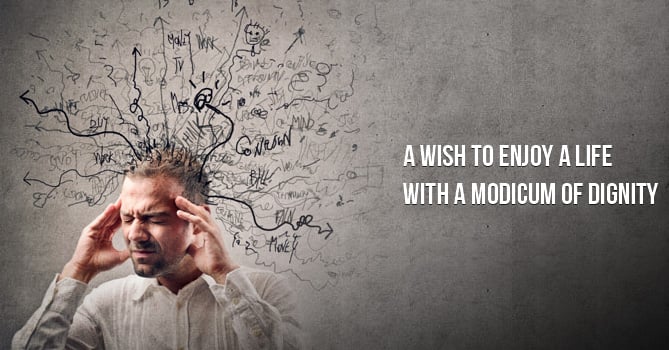The World Mental Health Day is celebrated every year on 10 October. The main aim of commemorating this day is to create and increase awareness pertaining to issues related to mental health around the world. Through this day, the World Health Organization (WHO) attempts to rally efforts that would support the cause of mental health. This particular day offers a chance to each and every entity working in the domain of mental health to express their opinions on the work that they do. They can also come up with suggestions on what they think needs to be done further in order to ensure that people across the world are able to access mental healthcare.
World Mental Health Day
The theme of the World Mental Health Day is dignity in mental health. There are innumerable people around the world who are unable to enjoy basic human rights for some reason or the other. They face a lot of discrimination as well as living with the experience of being on the fringes and constant ostracism. They are physically and mentally violated at both their immediate community as well as the health facilities, where they are supposed to receive basic care as well as in prisons. At times, there are not sufficient health professionals, who have the necessary qualifications to carry out the task assigned to them. On other occasions, the facilities may not be up to the mark. All these factors together create a situation where these hapless people encounter problems. This only makes their situation far worse than it already is.
Condition of People with Mental Issues
As may be clear from the discussion above that on a general basis, people with mental issues never receive the same degree of respect accorded to people regarded as sane as per generally-accepted parameters. Quite often, they are kept at places where they stay in isolation from their known society and the treatment accorded to them is thoroughly derogatory and inhuman. More often than not, ones with mental issues never get the right to decide their own matters as that right is taken away from them.
They are unable to decide what kind of treatment and care they will receive, the place where they will live, and other affairs related to their financial and personal lives. Since most of them do not get treated for their condition, owing to lack of access to mental healthcare, it is highly likely that they may live for a lesser period of time compared to people with sound mental health. They do not have access to jobs or education like normal people.
There are plenty of misconceptions about as well as stigmas attached to these people and this means they are discriminated against when they try to seek a job. As a result, they cannot earn and make a living. Mentally-challenged children are quite often not allowed to study. Thus they get marginalized and face problems later on in life. Moreover, they are never allowed the chance of complete social participation like taking part in public affairs, contesting for a public office, or voting for one.
They do not even have the right to decide on matters that are going to affect them like policies on mental health or any reform to the same or mental health services in general. Quite often, they cannot take part in cultural and recreational activities as well. The worst thing of all this is that the whole process happens in a systematic way – it is like the society plotting to keep out the unfortunate souls that it is tasked to protect.
What will the WHO do this year?
This year WHO will attempt to increase the levels of awareness regarding the steps that need to be taken in order to make sure that people who already have issues with their mental health are able to enjoy a life with a modicum of dignity. WHO will try and make sure that they are afforded proper protection by laws and policies that are governed by principles of human rights. It will also try to make sure that mental health professionals are properly trained, so that they are able to provide the level of care that is expected of them. The global organization will also try and put its best foot forward to make sure that greater respect is accorded to these individuals by taking their consent before any treatment is done.
Normally, people with mental issues are excluded from the decision-making process in most cases. WHO will try and create a scenario where this holds true no more. A number of public information campaigns are supposed to be organized as well. It is also attempting to foster a recovery-based approach to these issues. This is expected to empower mental health professionals help realize the dreams of these people and have a normal life like others. Training programs are being created with the end aim of helping the professionals and family members understand the basic rights of these people and promote them.
They will also be taught how to bring about a positive change in the general behavior and attitude shown towards them. WHO is also attempting to create peer networks and civil society bodies and strengthen them in such a way that they enjoy a greater connection with the people who have mental issues. Families, too, are being made parts of these setups.
What can we do?
Apart from lending our support to the abovementioned programs, we can practice a few things in our daily life that will go a long way in making the world a better place for people with mental challenges. We need to respect the fact that these people too have the right to take decisions on matters related to them and we need to support them and acknowledge the contributions that they are making.
Sources:
http://www.who.int/mental_health/world-mental-health-day/en/
http://www.who.int/mental_health/world-mental-health-day/2015/en/
http://www.who.int/mental_health/world-mental-health-day/2015_infosheet/en/

